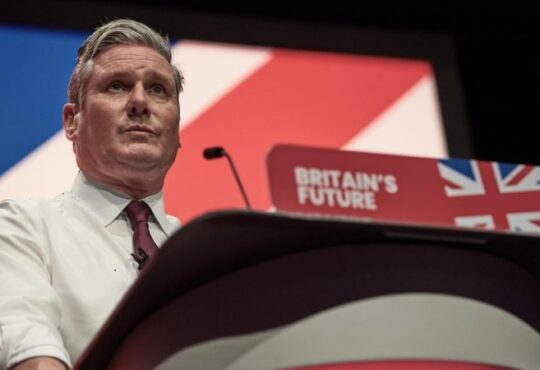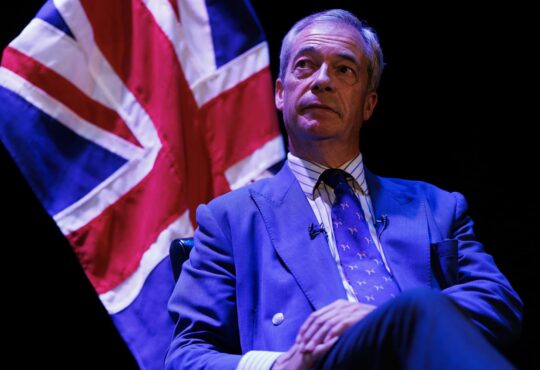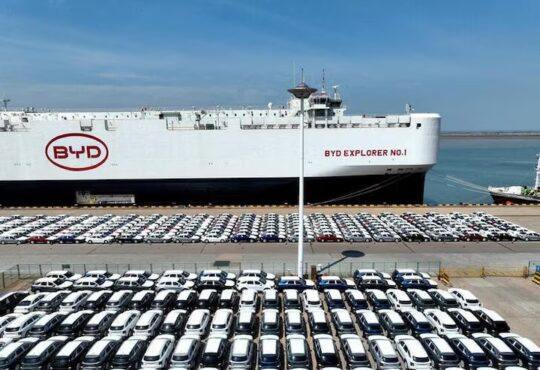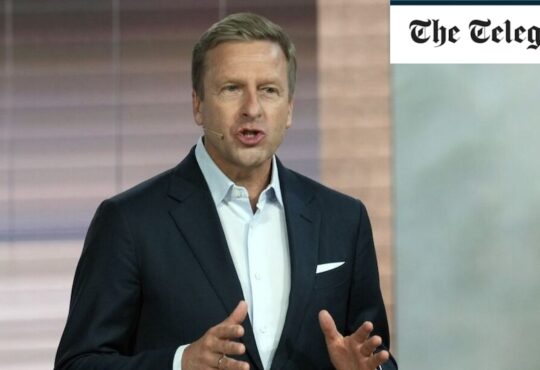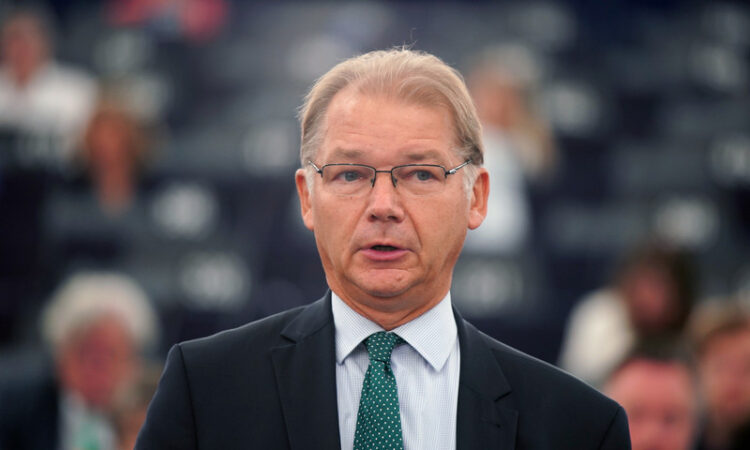
EU lawmakers will vote on whether to approve the bloc’s revamped fiscal rules on Wednesday (17 January).
Meant to promote “economic stability and growth,” Philippe Lamberts, leader of the Greens in parliament, warns that reimposing spending limits will instead lead to austerity, political upheaval and a failure of Europe’s climate policies.
In December, the EU Council and the parliament’s economy committee agreed on their separate proposals for new fiscal rules, which will require much of Europe to start making painful spending cuts this year — of up to one percent of GDP annually.
But Lamberts said he is committed to “derail” the text and to “ensure that there is no deal because we cannot afford to have a bad deal”. After all, “you know what austerity breeds? It breeds fire, right? It breeds national populism.”
Authoritarianism
“Have you read the book The Sleepwalkers?” he asks on Zoom, in an interview with Euractiv and EUobserver, referring to the book by the historian Christopher Clark on how Europe stumbled into the cataclysm of World War One.
“That is exactly the feeling I have today: the collective leadership of the European Union is sleepwalking us into the abyss. I am serious: I don’t know whether it will end in war, but there will be chaos.”
The comparison would arguably be more applicable to how austerity helped pave the way for fascism, national socialism and the Second World War. But his remark reveals the unease of navigating a world that seems primed for disaster—where military power, climate policy and economics are increasingly seen as interrelated.
More recently, a growing body of research has linked austerity to the rise of the far-right in Europe, which, among other things, is putting European climate policies at risk.
“It is not a given that the more right you are, the more austerity you want,” said Lamberts, whose Green party, along with the far-right Identity and Democracy Group (ID) party and the Left, voted to reject the draft fiscal rules text in the European Parliament’s economy committee in December.
But he suggests that people who vote against “being let down” are driven to the right by public spending cuts “especially in underpopulated areas.”
This week, parliament will vote on the text in Strasbourg, after which the council and parliament enter trilogue negotiations to finalise the rules.
And although some changes can still be made, it seems unlikely the contents of the text will alter much because the centre-left Socialists and Democrats (S&D) seemingly support the rules.
“I am desperate for the S&D to change their minds and reject the proposal. What need to make a grand bargain after the election,” said Lamberts.
Derailing the rules
Derailing the hard-fought agreement may seem counterproductive. But Lamberts insists that fiscal rules aimed at reducing debt now will make it impossible for countries to transition to a green economy in time.
“Even if the rules are not implemented or prove unworkable as some suggest, they will have a chilling effect on investment,” he said.
“If you look at the climate challenge, there’s a number of studies, including one that we are going to release in a few weeks, that try to quantify the investments needed to achieve net zero in 2050,” Lamberts told EUobserver.
“We conclude that 2.3 percent of GDP of extra investment will be needed annually, two-thirds of which would have to come from the public purse,” he said. “Some say we can compensate for this with a wealth tax, but that won’t be enough.”
Combining increased green spending while reducing debt “is only possible by cutting social spending on education, health, culture, or housing,” he said. “That is why we have to resist these rules.”
The cost of austerity
The Greens’ estimates of the necessary public investment are higher than the 0.5 to one percent increase of public investments estimated by Bruegel, a Brussels-based think tank. But Lamberts warnings against a return to austerity are grounded in fact.
According to Breugel director Jeromin Zettelmeyer, the current debt proposal would require Italy and Spain to reduce spending by an annual 0.6 percent over seven years.
France has to cut 0.5 percent annually, which may not sound like much, but it adds up to a yearly national income of nearly three trillion euros.
“I am no gambler, but I am willing to bet this will not happen and that after a few years, the rules will prove unworkable,” the economist Olivier Blanchard tweeted after reviewing the rules in December.
“Climate investments mean debts will increase in Europe in the next 20 years. And we have to accept that,” said Lamberts.
“I am not saying that having a massive deficit is a good thing. But Europe’s aggregate debt to GDP ratio is 90 percent,” he added. “But compared to the 126 percent in the US, and 263 percent in Japan, you see: we are still in the low range.”
“If I speak to investors—the Blackrocks and Avisas of this world—they are not worried about debt levels: they are worried about the ability of Europe to find its economic game plan, and that money is invested in an economically viable sense,” he said.
Indeed, in determining a country’s creditworthiness, the debt-to-GDP ratio is given a low priority by all major credit rating agencies like Fitch Ratings, Moody’s, S&P and Scope Ratings.
New Rules
Lamberts emphasises he is not opposed to fiscal rules per se. But he argues that the commission should be able to exercise more power to bring member state spending in alignment with the bloc’s goals on climate, energy, research and defence.
“And yes, this includes sanctions or fines for member states whose spending plans are not geared towards these targets,” he said.
In addition, Lamberts says Europe needs structural joint debt to help pay for climate policies, comparable to the EU’s Pandemic Reconstruction and Resiliency Facility (RRF).
Although a one-off, when all is said and done, €800bn will have been invested in the European economy by 2026, financed by EU debt.
The problem, according to Lamberts, is that there is no replacement after it, which he says is needed “because some member states will not have the fiscal space to invest [in green technology]. And then Europe must step in.”
Last week, Paolo Gentiloni, the powerful economy commissioner and a member of the S&D, reiterated a call for such a fund during a discussion in parliament.
Margarida Marques, S&D’s co-rapporteur on the file who also attended the discussion, also called for a fund to replace the RRF after 2026. But Lambert reserves his fiercest criticism for how the socialists handled the file.
According to him, the socialists “cut off their hand” in the hope that “three years from now there will be a doctor able to heal it. Maybe next time they can start by not cutting it off in the first place,” he commented.
“I was totally puzzled that the Social Democrats fought like hell to have authorship on [fiscal rules in parliament],” he said. “Much better to leave it to the EPP to make a proposal and then shoot at it instead of being complicit from day one. At the very least, if you do [claim the file], then put in a fighter.”
“Margarida Marques is not a fighter,” he said. “When I asked her what her red line was, she said that she only had one demand: that the agreement would be finalised before the election.”
“They basically said: we will accept anything. And she did. She agreed to numerical benchmarks [for debt and deficit reduction] that shouldn’t be there, and they got almost nothing in return,” he said.
“It may sound strange coming from a green [politician]. But right at the moment when China and the US have woken up to the green challenge and are investing much bigger figures than us, we refuse to give ourselves the means to invest and compete,” he said.
What would be the worst-case scenario?
“If the rules come into force, a freezing effect on public finances will undermine defence and climate spending,” he said.
“If we stop giving financial aid to Ukraine because we have decided we don’t want to spend any more money. Putin would win, and we cannot let that happen,” he said. “But when I speak to some of my colleagues in parliament, they don’t give me the impression that they grasp the gravity of the situation.”

